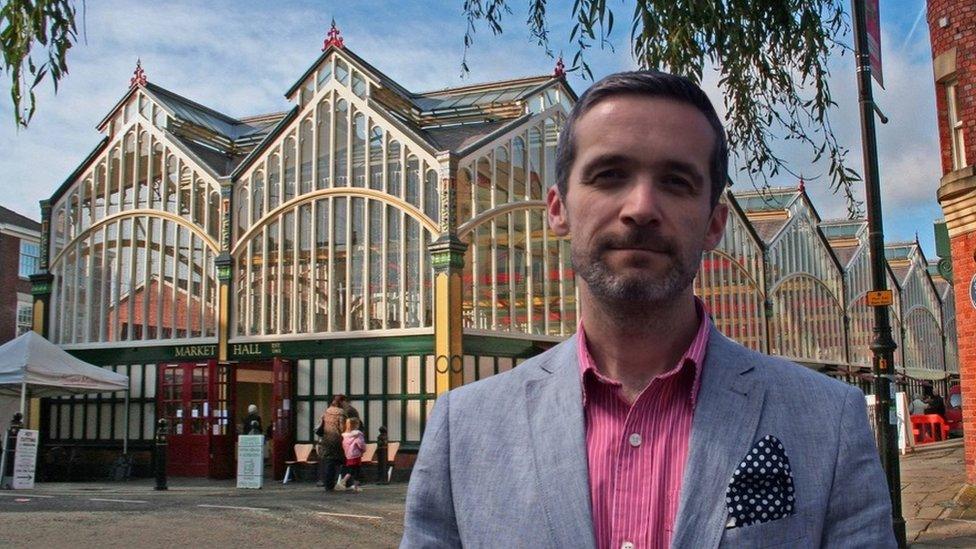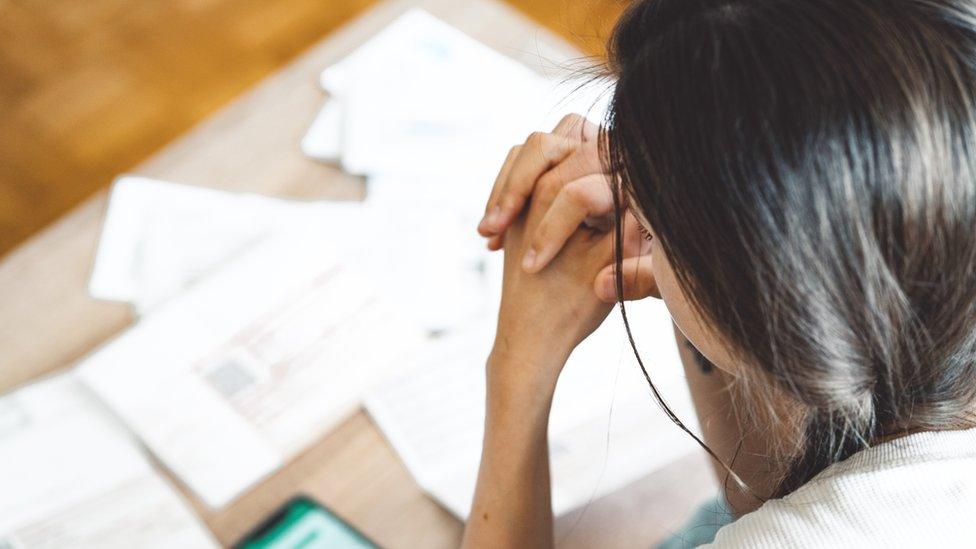Coronavirus: 'There is help out there if you ask for it'
- Published

Natalie Raeside has been a painter and decorator for 20 years, following in her father's footsteps.
The 36-year-old, a former British Young Decorator of the Year, was self-employed and doing well enough to tick along. She never expected herself to be on the breadline.
But then her 15-year-old daughter, a first-rate figure skater, fell in training and fractured her hip.
Natalie, a single mother from Ayrshire, took time off to look after her, only to find her return to work had been curtailed by the coronavirus outbreak. A steady income that paid the bills went down to nothing.
"There are many people in the same position as me, working successfully and never thinking we would be in this situation," she says.
"I had enough to get us through March, but getting into April looked hard."
Food on the table
She made an application for universal credit, just like 1.4 million other people in the UK in the space of a month. The first benefits payment takes five weeks to come through, unless you take an advance.
She took to the phone to organise payment holidays, most significantly for her mortgage. Financial support promised by the government for the self-employed will not reach her until June.
Then, on a Facebook group, she learned about the Coronavirus Grant Fund from Turn2Us, a charity that helps people in financial hardship to gain access to welfare benefits, grants and support.
The grants of £500, which are funded by donations, do not need to be paid back. People in sudden hardship, with less than £1,000 in savings as an individual, or £2,000 as a couple, can apply.
Natalie was one of the very first to benefit.
"It has allowed me to pay some bills and, most importantly, for food," she says. "My message is that there is help out there if you ask for it."

Where to go for help
Turn2Us, external - a national charity offering benefits information, grants and support
Citizens Advice, external - help with benefits, consumer issues and other work and financial matters
Credit unions, external - locally based, regulated loan and savings membership organisations
Search for grants, external from a range of organisations

That help is being provided by organisations across the charity sector, but also through support from businesses less affected by the lockdown, banks, and credit unions.
Many are drawing on the generosity of spirit displayed in neighbourhoods as they clap their support for NHS and care workers, and are translating that into financial generosity.
The Turn2Us appeal has raised £1.6m in just three weeks, all of which will go to people in hardship in the form of £500 grants and increasing the opening hours of its free helpline. The money is paid within three days or less of an online application, which must include evidence of an applicant's difficulties, such as bank statements.
"It is always £500 - enough for food and bills for a couple of weeks until benefits come in," says Thomas Lawson, the charity's chief executive.
He says that while government support is generous, it will not reach some people fast enough, if at all.

Thomas Lawson says charities can offer a financial lifeline
That was when grant organisations such as his, as well as the welfare system, needed to step in. We should remember, he argues, that those working in job centres are also on the front line of this crisis.
The charity's research suggests the self-employed, single mums and 18 to 25-year-olds who already had insecure jobs, such as working on zero-hours contracts, were particularly at risk from the economic effects of the pandemic. Overall, it estimates that 3.5 million people could make new claims for universal credit.
Some 31% of those seeking help from the organisation did not have enough money to pay for food right now.
"People on the lowest incomes are often the best at managing budgets. They want the dignity of working, but there is financial fragility for a vast number of people," Mr Lawson says.

Jonathan Moore says that community spirit is driving credit union investment
That fragility is also leading to greater demand for borrowing small amounts of money from credit unions to pay for food, rent and bills.
"If they do not come to us, they could be going to loan sharks," says Jonathan Moore, chief executive of Stockport Credit Union.
Its operation is much smaller than that of national charity Turn2Us, but the sentiment is much the same.
In an open letter to the local community, Mr Moore asked residents and business owners to invest £1,000 of their savings in the local credit union. This is not a donation, but an alternative savings account, which is fully protected.
The aim is to get 1,000 people to put money in, allowing the credit union to lend £1m at manageable interest rates to local people in need. People can join the "Friends Of" scheme online, external.
"It is the ideal opportunity for people who want to help their community if they have some money saved for a rainy day," says Mr Moore.
For those who have seen their income fall, and face the extra costs of children at home, a small credit union loan could make a big difference, he says.
'Massive thank you'
People and businesses are already making investments and donations to help those in need. One of those includes corporate finance company Oakley Advisory, which has donated to Turn2Us.
"Sadly it wasn't a surprise when we heard the sheer volume of additional calls they are getting and the increasing demand on their services across the board - from their digital services, to the thousands of people turning to them for crisis grants," said its managing partner Chris Godsmark.
"Charities like this are crucial in combating the secondary impact of coronavirus, which is on peoples' incomes and lives more broadly."
For those on the receiving end, there is gratitude.
"I just want to say a massive thank you," says Natalie Raeside, who now has the money to tide her over until government financial support arrives.
"I am so grateful, but I know there are so many other people in this position."

A SIMPLE GUIDE: How do I protect myself?
AVOIDING CONTACT: The rules on self-isolation and exercise
WILL I GET PAID IF I CAN'T WORK? Rules on sick pay and wages
LOOK-UP TOOL: Check cases in your area

- Published17 April 2020

- Published3 April 2020

- Published29 May 2020

- Published3 March 2021
